The Krygiers: Four Generations, Three Exiles
For my family, running away from tyranny is somewhere between a tradition and a curse we're doomed to repeat generation after generation. Part 3 of 3.


My grandfather was sipping a marroncito after a plate of pabellón. He was sitting on the balcony of his apartment, his eyes fixed on the Ávila. “Y, como se llama, we left Cuba and now tu sabes we are here… and ojalá ojalá Venezuela gets better,” he said, grabbing a cookie.
At 82, his sentences often include a como se llama and more than a few pauses as he tries to find words to express himself. As painful as these lapses are for the family, they must be even more so for a man as erudite as Alberto Krygier, who for more than 20 years wrote about politics for El Nacional and taught management to generations of college students. That came after a 30-year career as an accountant and as an economic consultant to former Venezuelan presidents Carlos Andres Perez and Jaime Lusinchi.
I put my guayoyito on the glass table between us. His mind searched as we went on. “My mother, what was her name, I don’t remember her name. How can I? MARIA,” he shouted to my grandmother, who had gone back into the house to answer the telephone.
“Ana, Ana was her name right?,” I said.
“Eh?”
“Her name was Ana,” I said, louder this time.
“Sí, Ana,” he said, rolling his eyes in frustration.
Ana Silberberg, my great grandmother, left the small Polish town of Stopnica in 1924. The three million Jews who lived in Poland then were caught in between conflicts among the new neighbors of the Second Republic of Poland, created by the Allied powers after World War I. Anti-semitism was official policy. Not only were Jews not allowed to join the civil service, teach in public schools, or work state-run monopolies, but since Poles associated them with the Bolshevik revolution, jews were massacred across the country.
Ana joined a group of Zionists who planned to get to Palestine by way of Havana and the United States. She was a passionate Zionist and Communist, as were so many Jews in Eastern Europe at the time. In Havana, the wait for documents made the 25-year-old grow desperate. “She had no money so she stowed herself away in a boat” bound for Miami, my grandfather said and nodded, sliding his lower lip over his upper lip, a tick of his.
When her boat arrived in the U.S., the authorities detained her and deported her back to Cuba. “Cuba took her and also my dad,” Adada said. I brushed cookie crumbs off his shirt.
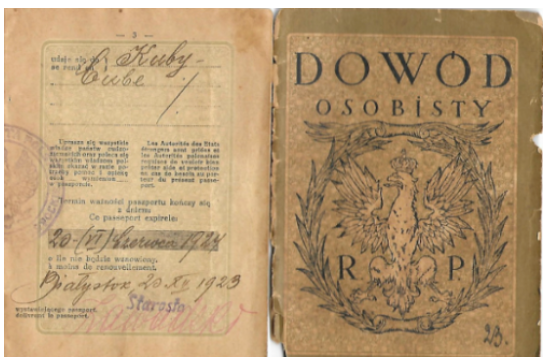
Max’s Polish Passport
Like Ana, my great grandfather Max Krygier, was a Zionist and a Communist who dreamed of starting afresh in Palestine. His ambition was to join a kibbutz. He fled his birth town of Staszow with a group that hoped to reach Palestine via Germany. But in Berlin, they were unable to get the required permits. So Max and his brother went to Cuba in 1923 with the idea of getting to the United States from there.
Ana and Max joined the wave of Ashkenazi Jews from Eastern Europe and Russia that arrived in Havana in the 1920s. An established community of 8,000 Jews helped them find their way during their first years on the Caribbean Island. They soon met and in 1929 they got married. They climbed the ladder to the upper middle class when Max came to own a shoe shop. Two years later, my grandfather’s older brother, Eduardo, was born. In 1934 my grandfather, Alberto, was born.
Most of Cuba’s Jewish community arrived just like my great grandparents did – empty handed. In fact, Cuba had been receiving Jews as far back as 1492 when the Inquisition expelled them from Spain. In the 1920s, Sephardic Jews arrived from Central Europe and Turkey as the Turkish war of liberation unfolded, and in the early 1940s, some 3,000 Jews found refuge on the island, escaping the Nazis.
By 1952, the Jewish population of Cuba had grown to 15,000. Mostly businessmen, Jews were involved in all aspects of the Cuban economy, especially in sugarcane, tobacco, and the garment markets. My grandmother’s dad, Jacobo Glekel, for example, also an Ashkenazi Jew who had arrived to Cuba from Lithuania in the early 1920s, had a men’s clothing shop.
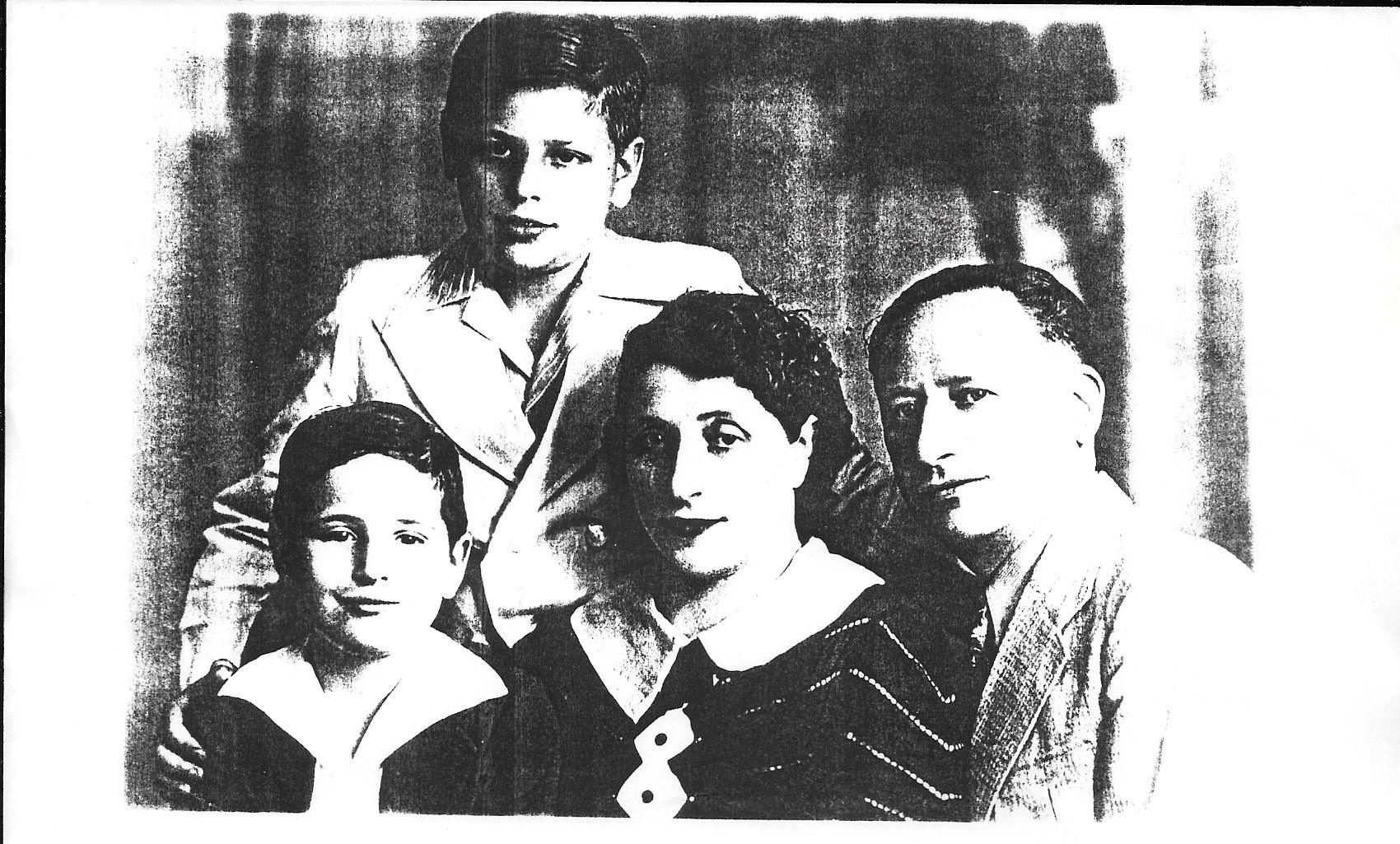
From left to right: Alberto, Eduardo, Ana, and Max.
Adada—as we call my grandfather—and my grandmother Maria Glekel met in 1955 at the Casino Deportivo, a club in Havana where Jewish youth gathered in the afternoons. Adada was 21 years old and in college and Mima —as we in the family call my grandmother— was 16 and still in high school.
While studying at the University of Havana for a law degree by day and an accounting degree by night, Adada worked with student groups to overthrow the Batista dictatorship. In a way, he was engaged in efforts that advanced Castro’s cause. But despite the dictatorship, he and Mima remember their lives before Castro’s rise as joyful, tranquil, and culturally engaged.
Their childhood friend, Ida Schumer, whose parents were also Polish refugees, recalls Havana as the quintessence of modernity. “We were in the last Coca Cola of the desert,” she said.
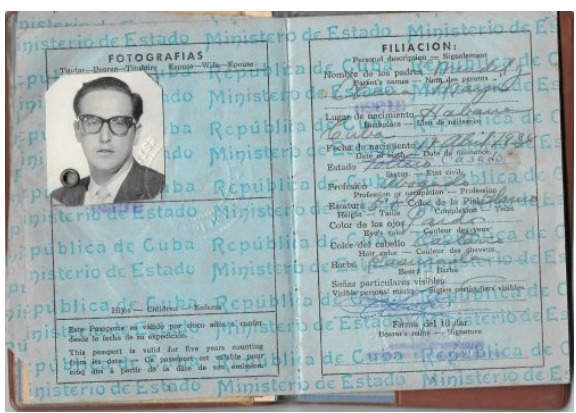
Alberto’s Cuban Passport
In 1957, as Adada was studying in New Orleans for a masters degree in consulting from Tulane, it took weeks for the letters he sent back to my grandmother in Havana to arrive. Mima remembers his long detailed accounts of his whereabouts, his impeccable spelling and the poetic phrasing of his sentences. They married in Havana a year later, in 1958. Mima was 20 years old; Adada was 25. They promptly moved to New York where he went to work for the then “Big Five” accounting firm Arthur Andersen. Their plan was to go back to Cuba after a year or two.
From their new home on West 8th Street, they celebrated Castro’s triumph. But not for long. At the end of 1959, when Mima gave Adada an ultimatum to leave New York because she couldn’t stand the cold winters, Castro’s fusillading of opponents and confiscation of lands and businesses made the prospect of return untenable. Friends back home were trying to leave and their parents were struggling to keep their businesses going.
In 1960, Adada accepted a transfer to Venezuela, where some of his friends had already established themselves. It was growing, foreign-owned companies were flourishing, the economy was stable, and the culture, the language and the people were similar to Cuba’s. Plus, it was summer all year round so Maria would not complain.
One year later, the Castro government confiscated both of my great grandfather’s shops back in Cuba. They and their wives filled one suitcase each and fled to Caracas. By then, Venezuelan President Romulo Betancourt was leading what the Cuban government called “hemispheric aggressions” against the revolution.
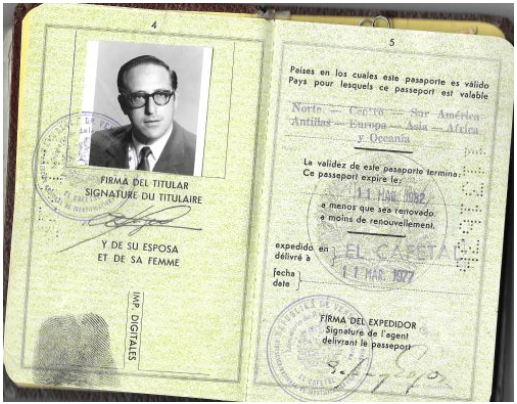
Alberto’s Venezuelan passport
My grandfather’s story is like that of other Jewish Cubans whose families, over generations, in the space of 95 years, have migrated at least twice. Most went to Cuba from the Middle East, Western and Eastern Europe, and then left during the first years of Castro’s rule, when the Jewish Community of Cuba shrunk to half its size.
Generally educated professionals, now between the ages of 80 and 90, they arrived to Venezuela about 40 years before Chavez came to power, joining a Jewish community that like Cuba’s was made up of immigrants. They either left Venezuela or had children who left when the Bolivarian Revolution came. Ida Schumer, who arrived in Caracas in 1960, expressed it this way: “We the Jews have the button of just running away. Sadly, it is in our souls.”
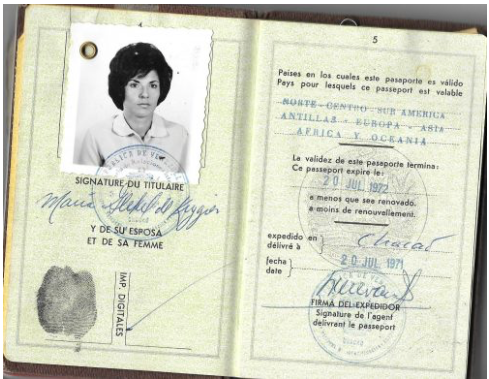
Maria’s Venezuelan Passport
My Aunt Francis was born in Caracas, two years after my grandparents arrived and my father, Aron, came two years later, in 1964. By the time my Aunt Tamara was born in 1971, my grandparents were well-established, as were the 15,000 members of the growing Jewish community (just 800 Jews were left in Cuba by then). Adada had founded a successful consulting firm, Krygier & Asociados, following a decade with Arthur Andersen as one of its main representatives in Latin America. His two bouts working as a presidential adviser took place between 1974 and 1989.
A decade later, Chavez triumphed and within a year he changed the name of the country, created a new Constitution, and made other adjustments that expanded the range of his powers. Within four years, he nationalized Venezuela’s rich oil resources and started expropriating private companies. By 2013, a total of 1285 private businesses had been expropriated. His discourse was very much like Castro’s. He vilified the middle and upper classes, accused their members of imperialism, and extolled Simon Bolivar.
My great grandparents Max and Ana migrated separately from Poland to Cuba in 1924. They both left Havana to Caracas in 1961, joining my grandfather Alberto and my grandmother Maria who arrived in 1960.
My grandparents did not leave. Their whole lives were in Venezuela: their work, their children, grandchildren and now great grandchildren. They have aged as their adopted country increasingly resembles what they hoped to leave behind.
I was only five years old in 1999, but I recall hearing my family’s conversations throughout my childhood; Mima’s warnings, ‘ya tu vas a ver how this will turn into Cuba.’ And her children’s inevitable reply: ‘Don’t exaggerate Ma. It’s not the same.’
My mom remembers that Mima in fact predicted what would happen in very specific ways. She said for example, that something similar to the Milicias Cubanas would emerge. My mother remembers how farfetched that idea seemed before it took root in Venezuela. And yet in 2003, the government established the Misiones and in 2005, the Bolivarian Militia. It then turned out that a substantial part of the workers would be sent directly from Cuba.
This past January, I met in Caracas with political scientist Carlos Romero, a professor at the Universidad Católica Andres Bello, at a cafe that had no water to serve us. He elaborated on the 40,000 Cuban workers who had come to Venezuela by 2007 as part of a treaty between the two countries: Venezuelan oil in exchange for Cuban labor. They easily outnumbered the core Cuban community in the country, which currently has about 10,000 members. He said the workers could be seen as the fifth wave of Cuban migrants to the country. Thousands of them—20,000, Romero specified-—have since “deserted” the program and sought residency in the United States.
Now that the country is in the worse crisis of its history, illustrations of Chavez’s eyes still linger on Caracas buildings and graffiti of his face on street side walls. His slogans are still on the billboards where commercial advertisements had dazzled Martinez when she first arrived. Yet never has the Chavista government been so unpopular. The fallout from the failures of the regime are pervasive. Even the the poor, the regime’s main support base, have lost faith.
Pervasive shortages plagues the country, accompanied by long lines, intrusive regulations, and all that propaganda. It’s all deja vu for the country’s Cubans.
Conversations at our Shabbat tables and in our family Whatsapp groups (both maternal and paternal) have veered to urgent concerns. “Good morning. I need bleach, dishwashing soap, detergent, and skim milk. That’s it for now. Thank you,” typed my grandmother recently.
Who needs olive oil or shampoo? I have a contact who has both.
Since you are going to Miami soon, can you bring some Ensure for Adada?
Have you seen what apples are worth?
Food was awful last night. Restaurants are getting bad, right?
Sometimes we joke. Dark humor is alive. My uncle likes to say, But we have Patria!, when we are all complaining about something. My brothers send each other pictures of things that happen solo en Venezuela.
My father is an oncological surgeon. Although the price of a visit to a doctor’s office costs the same as five packs of flour on the black market, migrating would pose even greater challenges. At 52, he would not only have to struggle with growing a practice, he would have to spend years re-validating his medical credentials before he could see patients. But even more than this holds us back from leaving Venezuela permanently. Our strong sense of belonging persists.
In the 2012 presidential election where Henrique Capriles Radonski campaigned against Hugo Chavez, I went home from New York for the weekend, just to vote. That night we all shouted at each other, mostly at my dad, who was not admitting the gravity of what had happened. The country will soon hit rock bottom and change will come, he said. My mother, who usually takes his side and is our most optimistic voice, even joined my brothers and me in a show of frustration.
We had the same reaction in 2013, when Capriles denounced as fraud the election win of Maduro’s by little more than 1 percent of the vote. Months later, my brother joined bands of furious students in the streets. I remember containing my tears in class as a photo of him appeared in my Whatsapp feed, getting in the front lines of the protests. I swear I tried to stop him, my mother texted me, but he’s enraged.
Then came last December 6th. I called my mother at midnight and we spoke for half an hour between bouts of laughter and tears. For the first time in 17 years, the prospect of the Venezuela my family had come to call home might not be lost. Might.
Just last week, on September 1st, I got some photos. My grandmother smiling. I imagined her among waves and waves of discontent people. It made me shiver. I couldn’t take my eyes off my phone.
To feel like I was doing something, at least a little thing, I tweeted out all the pictures I got. Each one showed a fuller crowd.
It was a good day, a day that ended with high expectations but even higher doubts.
Our family’s future, like that of the country’s, is still as it has been for as long I can remember: absolutely uncertain.
But we all try to remain hopeful as we have been taught since we were very young. When I was 12, my parents engaged passionately in all of the protests of 2002. The jean jacket that my mother had worn during the marches, full of Venezuelan flag pins and opposition symbols, hung in our living room for many years. She took it down at some point, when the memories it brought became too bitter for us all. A while back, I asked her what had become of it.
“I keep it safe, as a historic document of how much we have fought to achieve our long awaited return to democracy, our liberty!,” she texted back.
“Every time I add a new pin, I hang it back in the closet with the certainty that, although it might not be the last one, the story will end with the jacket framed in an acrylic box and hanged in the most inescapable wall of the house. I do not lose hope.”
Days later, she clarified: “It’s not only that we don’t lose hope. There’s a lot of us Venezuelans who are convinced that countries don’t die, and that if we don’t end up participating in its reconstruction, we have raised children who will.”
Caracas Chronicles is 100% reader-supported.
We’ve been able to hang on for 22 years in one of the craziest media landscapes in the world. We’ve seen different media outlets in Venezuela (and abroad) closing shop, something we’re looking to avoid at all costs. Your collaboration goes a long way in helping us weather the storm.
Donate




